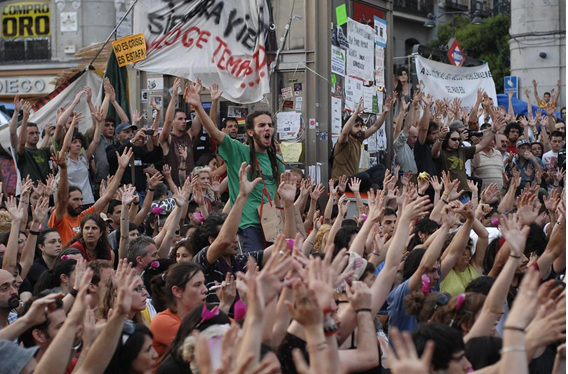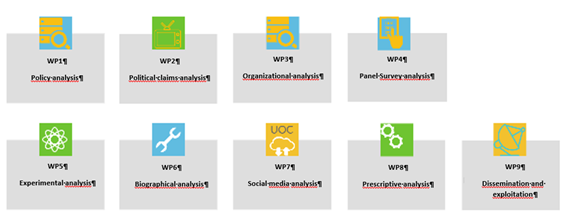
Anna Clua Infante, Núria Ferran-Ferrer, Ismael Peña-López i Ludovic Terren
Reinventing Democracy in Europe: Youth Doing Politics in Times of Increasing Inequalities
Reading time: 6 minutes
This series is offered by researchers, science communicators and academic staff working together to bring you into closer contact with science. The “Dive into Science Week with UOC Researchers” series combines the UOC’s online expertise with the offline events organized for Science Week to create an online slow-reading experience. For Science Week 2017, we’ll share scientific knowledge on e-learning, eHealth, digital humanities, and ICTs in social science. Today we highlight the research on the role of social inequalities on youth political participation in the Horizon 2020-funded EURYKA project.
Reinventing democracy in Europe
Within the framework of Science Week, we are pleased to present the project entitled Reinventing Democracy in Europe: Youth Doing Politics in Times of Increasing Inequalities (EURYKA). EURYKA is a three-year Horizon 2020 research project that aims to study the relations between inequalities and young people’s ways of doing politics both offline and online, and to advance scenarios for future democratic models and political systems that are more inclusive for young people across Europe.
Given the centrality of popular political involvement for healthy democracies, it is particularly concerning that European democratic systems are facing a profound crisis nowadays in light of a sustained decline in political participation and the waning legitimacy that goes with it. On the one hand, this crisis concerns the nature and quality of young people’s political participation in European democratic life; on the other hand, it has to do with different forms of social, economic and political, as well as intra- and inter-generational, inequalities exacerbated by the economic crisis and the subsequent austerity measures, challenging young people's aspirations for prosperity, growth, and stability.
Youth doing politics in times of increasing inequalities
While young people seem to have a fairly substantial interest in politics and political issues, this interest seems to translate less and less into comparable levels of engagement with formal politics and the political system in the traditional sense. Indeed, political participation includes more mainstream or conventional types of activities such as voting or being a member of a political party, as well as more confrontational or unconventional modes of participation such as occupying a square or taking part in a protest. It also increasingly includes new forms of political engagement that take place through new channels like social media.
Although young citizens tend to disengage from conventional politics, they are also, by far, the most mobilized age group in many types of political participation which require a range of resources, time and sustained effort, such as the post-Occupy movements in Spain and Greece and the UK's anti-cuts protests in 2011. Young people often stand as the driving forces behind political movements that aim to change societies and political systems. Hence, it may be the case that, rather than being depoliticized, as has often been assumed, young people in different national contexts may be contributing to the advent of a new, alternative era of political participation.

Exploring youth agency and political participation in a rapidly changing world
It is within this matrix that EURYKA will explore youth agency and political participation in a rapidly changing world, in order to capture the normative dimensions of participation. The project’s main objectives are the following:
1) Provide systematic evidence of the mechanisms for coping with inequalities which are embedded in young people’s ways of doing politics. These coping mechanisms are manifested in multiple forms, for example, as either political (dis)engagement and contestation online and offline or as (trans)national democratic innovation and experimentation.
2) Generate knowledge on young people’s values, attitudes, and behaviours related to democracy, power, politics, policymaking, social and political participation (online and offline), and the organisation of economic, social and private life in order to identify ways in which to strengthen young people’s political participation and engagement with democratic life in Europe.
3) Suggest a set of future scenarios for the improvement of democracy and political participation in Europe, placing a particular emphasis on empowering young people, especially those with fewer opportunities.
The EURYKA research methods
To achieve this, the project puts forward a multidimensional theoretical framework, combining macro-level (institutional), meso-level (organizational), and micro-level (individual) explanatory factors; a cross-national comparative design, including European countries with different degrees of exposure to inequalities and different policy regimes (France, Germany, Greece, Italy, Poland, Spain, Sweden, Switzerland, and the UK); and an integrated methodological approach, based on multiple sources and methods (an analysis of public policies and practices towards youth, an analysis of actors’ interventions in the public domain on issues relating to youth, an organizational survey, a panel survey, survey experiments, biographical interviews, and a social media analysis).

EURYKA has been designed to contribute to the conceptual and empirical enhancement of the knowledge base on both young people's ways of doing politics and inequalities. The research will provide a critical assessment of current democratic practices in order to build more inclusive and reflective societies and reinvigorate democracies. It will also inform policymakers on how more novel – including ad hoc and digitally supported – participation repertoires may or may not qualify as a substitute for more traditional democratic participation (especially electoral). This aspect will be scrutinized particularly in the social media analysis (which will be coordinated by the UOC team). By looking at young people’s ways of doing politics online and the impact of inequalities on it, EURYKA will yield important insights as to how social media have influenced and are influencing the European youth participatory scene and whether these can potentially constitute new tools that can be used to reconnect young citizens with democracy and their political systems.
The expected impact of the EURYKA project
The final steps of the project will focus on how the European Community and its Member States can go about putting in place a framework to engage policymakers. This framework should provide them with all the necessary tools to involve young people and youth organizations in developing, implementing, and evaluating the policies that affect them through shared decision-making. The project will set up an innovative dissemination and policy learning mechanism, the “priority action network” (online platform), which will act as a knowledge hub to convey identified solutions to key decision makers. It will also provide evidence-based “priority actions” aimed at opening up opportunities for young people in politics and policy as well as supporting new models of democracy across the countries in our project.
EURYKA thus promises to have a strong and long-lasting scientific impact. To our knowledge, this is the first far-reaching cross-national research project to examine simultaneously the macro-, meso-, and micro-level factors linked to the prospects and potential for youth participation as well as social and political change in Europe.
EURYKA partner institutions
Université de Genève (UNIGE), Switzerland – Coordinator
University of Sheffield (USFD), UK
Scuola Normale Superiore (SNS), Italy
Uppsala Universitet (UU), Sweden
Universität Siegen (USIEGEN), Germany
Fondation Nationale des Sciences Politiques (Sciences Po), France
Panepistimio Kritis (UoC), Greece
Uniwersytet Warszawski (UNIWARSAW), Poland
Universitat Oberta de Catalunya (UOC), Spain
European Alternatives Limited (EA), UK
